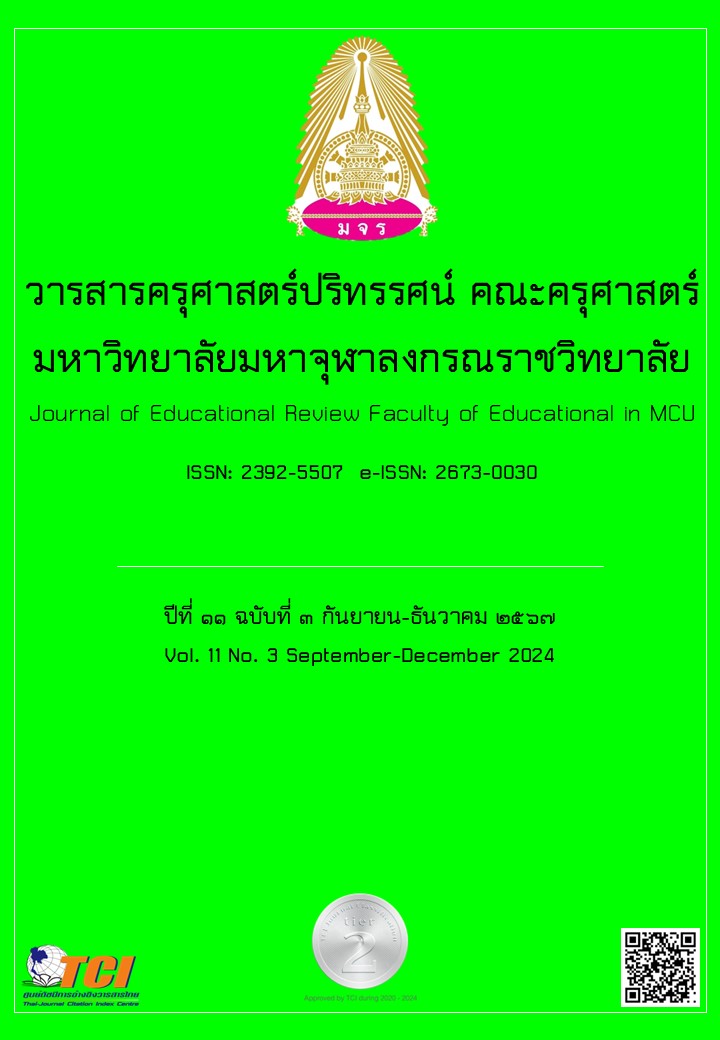THE SUPPORT PROCESS ON ORGANIZATION CULTURE FOR PERSONALS ADMINISTRATIVE DEVELOPMENT OF SCHOOL ADMINISTRATORS IN GROGPHRA DISTRICT OF NAKHON SAWAN PROVINCE BY THE PRINCIPLE OF 4 SAMMAPPATHAN (4 ATTEMTS)
Main Article Content
Abstract
This research aims to 1) study the status of organizational culture enhancement for personnel management development of school administrators and 2) present the process of organizational culture enhancement for personnel management development of school administrators according to the 4 Sammappadhna principles (Attempt). It is a mixed-method research by using quantitative research using a questionnaire with a population in the research of 151 people. The statistical data analysis included frequency, percentage, mean, and standard deviation. The qualitative research is conducted by interviewing 9 key informants. The data were analyzed by content analysis. The research results showed that 1) Overall, opinions on the status of organizational culture enhancement for personnel management development of school administrators were at a high level. When considering each aspect, opinions were at a high level in 5 aspects: honesty, diversity, decision-making process, recognition and reward, trust and confidence, respectively. Each aspect had a high level of opinions in 5 aspects: sense of belonging to the organization, compassion, goals of the educational institution, empowerment, and excellence, respectively. 2) The process of organizational culture enhancement for personnel management development of school administrators according to the 4 Sammappadhna principles consisted of (1) Joint planning and evaluation: Planning to create organizational culture by creating a manual for collecting information and reviewing work performance, analyzing problems to reduce risks and failures in work (2) Creating power and access to resources, managing resources in the organization adequately, evaluating and analyzing problems in resource management carefully (3) Consulting experts, planning decision-making in the organization by specifying the qualifications of experts, creating a network of experts, creating information, and evaluating work performance (4) Mutual assistance, creating an organizational culture that supports cooperation within the organization, creating good relationships among employees, exchanging ideas, creating a good work environment (5) Working according to aptitude, planning teacher development according to aptitude and interests, supporting further education, organizing training, sending teachers for study visits, creating academic information networks (6) Quality and standards according to work, planning clear quality and work performance standards, supporting teachers to be creative in developing teaching management, maintaining good behavior and behavior (7) Giving awards and compliments, compliments and rewards encouraging teachers to use their knowledge and abilities to the fullest, and creating commitment to work in the organization (8) Caring for teachers' well-being and taking care of their work, creating a good atmosphere for both physical and mental health, and ensuring safety in teachers' work (9) Access to organizational resources, supporting the physical environment in the unit by focusing on providing necessary equipment and tools, promoting teamwork and continuity (10) Evaluating work performance, careful planning of teacher performance evaluations, participation and use of a variety of assessment tools.
Article Details

This work is licensed under a Creative Commons Attribution-NonCommercial-NoDerivatives 4.0 International License.
ทัศนะและความคิดเห็นที่ปรากฏในบทความในวารสารฉบับนี้ถือเป็นความรับผิดชอบของผู้เขียนบทความนั้นเพียงผู้เดียว และไม่ถือเป็นทัศนะและความรับผิดชอบของกองบรรณาธิการ
กองบรรณาธิการขอสงวนสิทธิ์ในการคัดเลือกบทความลงตีพิมพ์และจะแจ้งให้เจ้าของบทความทราบหลังจากผู้ประเมินบทความตรวจอ่านบทความแล้ว
ต้นฉบับที่ได้รับการตีพิมพ์ในวารสารครุศาสตร์ปริทรรศน์ คณะครุศาสตร์ มหาวิทยาลัยมหาจุฬาลงกรณราชวิทยาลัย ถือเป็นกรรมสิทธิ์ของคณะครุศาสตร์ มหาวิทยาลัยมหาจุฬาลงกรณราชวิทยาลัย ห้ามนำข้อความทั้งหมดหรือบางส่วนไปพิมพ์ซ้ำ เว้นเสียแต่ว่าจะได้รับอนุญาตจากมหาวิทยาลัยฯ เป็นลายลักษณ์อักษร
References
ประพิม นภวงศ์ ณ อยุธยา. (2563). สภาพและแนวทางการพัฒนาการบริหารงานบุคคลของผู้บริหารสถานศึกษา สังกัดสานักงานส่งเสริมการศึกษานอกระบบ และการศึกษาตามอัธยาศัยจังหวัดบุรีรัมย์. วิทยานิพนธ์ครุศาสตรมหาบัณฑิต. มหาวิทยาลัยราชภัฏบุรีรัมย์.
พระเฉลิม ถิรปุญฺโญ (ดีเลิศ). (2565). ศึกษาการพัฒนามนุษย์ตามหลักสัมมัปปธาน 4 ในพระพุทธศาสนาเถรวาท. วิทยานิพนธ์พุทธศาสตรมหาบัณฑิต. มหาวิทยาลัยมหาจุฬาลงกรณราชวิทยาลัย.
พระราชบัญญัติการศึกษาแห่งชาติ. (2565). พระราชบัญญัติการศึกษาแห่งชาติ พ.ศ. 2542 แก้ไขเพิ่มเติม (ฉบับที่ 2) พ.ศ. 2545. แหล่งที่มา http//www.Kroobannok.com. สืบค้นเมื่อ 25 ต.ค. 2565.
ภารดี เกิดวาระ. (2564). แนวทางการพัฒนาการบริหารงานบุคคล ตามหลักไตรสิกขา โรงเรียนมัธยมศึกษา สังกัดสำนักงานเขตพื้นที่การศึกษามัธยมศึกษานครสวรรค์. วิทยานิพนธ์พุทธศาสตรมหาบัณฑิต. มหาวิทยาลัยมหาจุฬาลงกรณราชวิทยาลัย.
สำนักงานเขตพื้นที่การศึกษาประถมศึกษานครสวรรค์ เขต 1. (2565). รายงานผลการปฏิบัติการ ประจำปี 2565. นครสวรรค์: สำนักงานเขตพื้นที่การศึกษาประถมศึกษานครสวรรค์.


